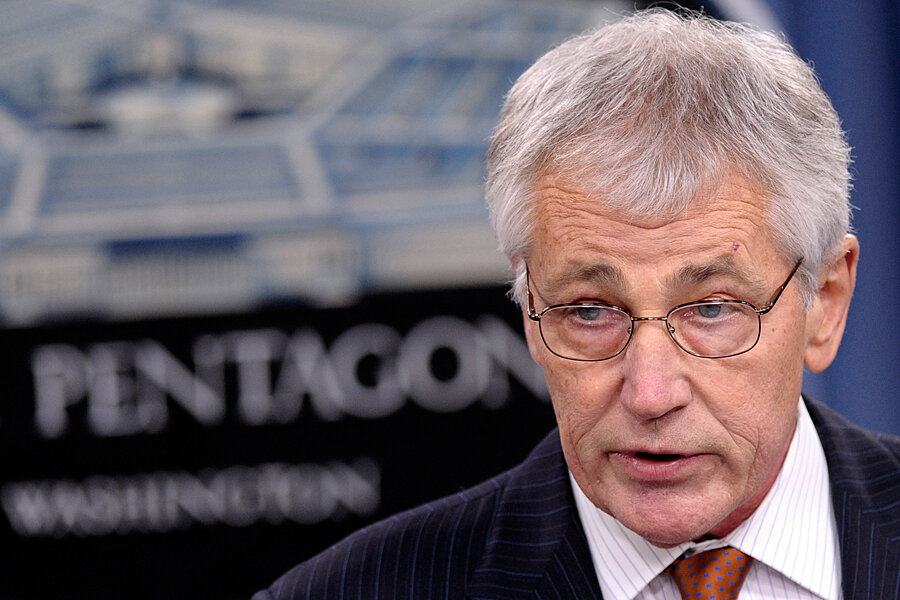Ukraine crisis: US boots on the ground in Poland is an option, Hagel says
Loading...
| Washington
While Pentagon officials say that they are most interested in ratcheting down tensions with Russia, they are nonetheless considering sending US ground forces into Poland.
“De-escalation is our focus,” Secretary of Defense Chuck Hagel said in a briefing with his Polish counterpart Thursday. But “based on past actions” of Russia, he added, “We have to look at every possibility.”
This includes “an entire range” of options, including a rotation of US troops sent to bases in Poland for training, special operations forces cooperation, and a stepped-up timeline for missile defense.
A dozen F-16 fighter jets and 200 US military support personnel based in Italy, who are currently in Poland, will be staying in the country at least through the end of the year, Secretary Hagel added.
So how big a threat is the Russian military, in the estimation of US defense officials?
At a minimum, “the actions of the Russians over the last two months,” not only violate territorial integrity and sovereignty, but are also “dangerously irresponsible,” Hagel warned.
The US measures announced in response to Russian actions this week are “not meant to provoke or threaten Russia,” Hagel added, but rather to “demonstrate NATO’s dedication to collective defense,” including Article 5 of the defense treaty, which says that NATO will come to the aid of any member nation under attack. “An attack against one will be considered an attack against all.”
Hagel and the Polish minister of defense, Tomasz Siemoniak, held their press conference before the announcement Thursday evening in Geneva that Secretary of State John Kerry and his counterparts from Russia, Ukraine, and the European Union had agreed on initial steps to de-escalate tensions over eastern Ukraine.
For now the Pentagon, at the behest of NATO Supreme Allied Commander General Philip Breedlove, is providing new supplies to the Ukrainian military, including sleeping mats, water purification units, helmets, and small generators.
There will also be more “air policing sorties” over the Baltics, as well as more allied ships in the Baltic and the eastern Mediterranean seas, Hagel added.
Polish and US military planners currently are involved in executing the recommendations that General Breedlove announced this week, Mr. Siemoniak said.
Such steps are prudent, defense analysts say. At the end of the Cold War, the Russian military “was in horrible shape,” says Christopher Harmer, a retired US Navy officer who served as deputy director of future operations for the US Navy’s Fifth Fleet.
Yet over the past five to six years, there has been a “significant increase” in the capabilities of the Russian military.
That is evident in the sense of confidence that the Russian military displayed in its annexation of Crimea, says Mr. Harmer, now a senior naval analyst with the Institute for the Study of War in Washington.
“The professionalism and capability they showed was impressive to me,” he adds. “I’m not happy with what happened, but as a professional analyst I look at it and say the Russians have their act together.”
This included sending “well led, well directed” Russian special operations forces into Crimea wearing no rank or insignia, and dressed in half-military, half-civilian attire, Harmer notes.
“Within the broader context of the Russian military getting more capable, we could be watching the opening scene in a new era of tensions.”
It is a development that the US and its NATO allies are watching closely. Russian President Vladimir Putin has formulated a doctrine based upon what he claims to be Russia’s need to protect Russian minorities in countries that had once been attached to the former Soviet Union. “And there are a number of such countries,” Siemoniak noted in the Pentagon briefing Thursday.
“Such doctrine gives rise to our concerns,” given that in Ukraine “in the name of the protection of unthreatened interests of the minority a brutal intervention is taking place,” he added. “It is true we are concerned with that.”
As Poland celebrates the 25th anniversary of its independence from the Soviet Union in June, coupled with “the aggressive policy taken by Russia, made Poland realize that these things [such as security] must not be taken for granted,” he added, “and how important alliances are.”







